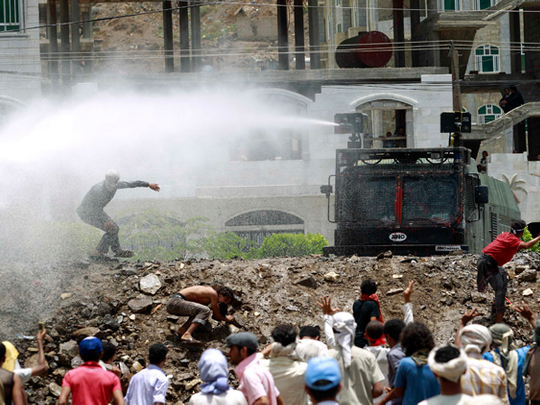
Dubai: Yemeni forces opened fire at protesters, killing three of them at three separate rallies and wounding at least 25 people as the embattled president defied calls for him to step down immediately.
The latest violence came as a Gulf Arab proposal for President Ali Abdullah Saleh to step down appears increasingly doomed, raising prospects of more bloodshed and instability.
In an interview with BBC Arabic, Saleh said he won’t hand over power to "insurrectionists".
“We are committed to constitutional legitimacy and don’t accept chaos,” Saleh said. “Whom shall I hand it over to? Those who are trying to make a coup? No. We will do it through ballot boxes and referendums.”
The opposition has fully accepted the Gulf power transfer plan, Reuters quoted an opposition source as saying. The source also said the opposition would participate in the transitional government.
Monday's deaths came during anti-Saleh protests in Ibb and in the central city Al Baida.
In the city of Ibb, 190km south of the capital Sana’a, demonstrators set fire to two cars used by government-paid thugs who shot at them, he said.
In Taiz, presidential guard troops fired bullets and tear gas into tens of thousands of protesters. A woman watching the clash from her balcony was shot dead.
Fear factor
The potential for fractious Yemen to descend further into bloodshed is a major concern for Saudi Arabia and the United States, who fear an active Al Qaida wing could exploit ensuing chaos to further entrench itself in the Arabian Peninsula state.
Clashes in Taiz were continuing, with heavy gunfire reported, and activists said the number of wounded was expected to rise. Similar clashes broke out in the town of Ibb, where three protesters were shot and wounded and four more were beaten with batons when police tried to break up a street march.
Saleh, facing pressure to resign to end three months of street protests, has agreed in principle to a Gulf Arab deal to step down within weeks in exchange for immunity from prosecution for him, his family and aides.
Yemen's main opposition coalition, made up of Islamists and leftists, have conditionally welcomed such a deal, but have stopped short of a full endorsement and said they would refrain from taking part in a unity government in a transition period. But no formal deal has been signed.
Protesters, who demand Saleh be prosecuted over a crackdown that has left more than 120 protesters dead since demonstrations began, have vowed to step up street protests, fearing Saleh's inner circle could slow or stop his departure.
Saleh, a political survivor, has said he would not seek reelection when his term ends in 2013, and later vowed to stand down this year after organising parliamentary and presidential elections.












